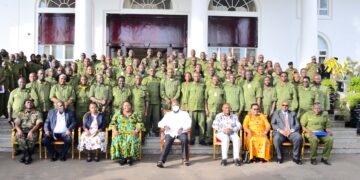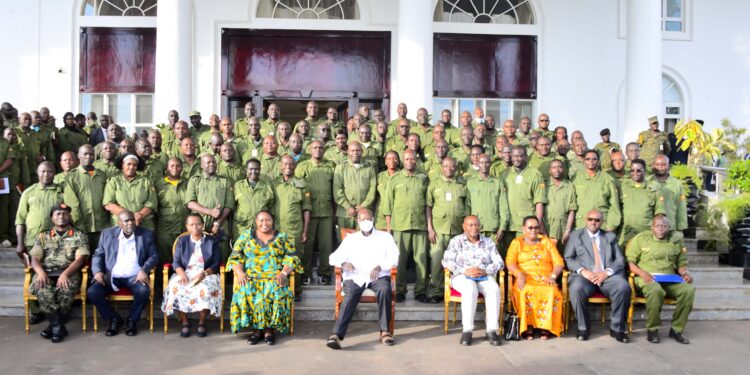President Yoweri Kaguta Museveni has urged leaders to confront persistent challenges that continue to undermine government service delivery and social transformation.
He pointed to key bottlenecks such as the sabotage of free education and healthcare, corruption, and land grabbing.
The President made the remarks during a meeting with about 200 Chief Administrative Officers (CAOs), Town Clerks, and Under Secretaries at State House, Entebbe. The group had recently completed a leadership training course at the National Leadership Institute (NALI) in Kyankwanzi under the theme “Transformative Public Service: A Path to Development, Improved Service Delivery, and Wealth Creation.”
In his address, President Museveni expressed concern over growing public mistrust, attributing it to various systemic failures. He cited illegal charges in government-aided schools as a betrayal of the Universal Primary and Secondary Education (UPE and USE) policies.
“Why has the political class failed to understand the importance of Boona Basome (Education for All)?” he asked. “We’re seeing dropouts because head teachers are imposing unauthorized fees, sabotaging our free education initiative.”
He urged CAOs and town clerks to enforce the no-fees policy and warned against turning public schools into de facto boarding schools, which he said places undue financial strain on poor families.
On healthcare, the President decried the rampant theft of medicines from government health facilities, despite notable success in disease elimination through immunization.
“Theft of drugs is a major irritant. While we’ve seen diseases like measles and polio disappear, corruption in health centres continues to cause suffering,” he noted.
Museveni also condemned land grabbing, especially when abetted by rogue elements within the security forces. He pledged to issue an Executive Order barring soldiers from meddling in land disputes. “The army is for defending our borders, not for policing land boundaries,” he emphasized.
The President stressed that eliminating these “irritants” would restore public trust and fast-track national development.
He also revisited the NRM’s 1996 Four-Acre Model, calling it the antidote for families with limited land. The model advocates for clonal coffee, fruit trees, pasture for dairy, and food crops on individual acres, supplemented with poultry, piggery, and fish farming in the backyard.
“These seven activities can transform rural livelihoods,” Museveni said, contrasting the approach with large-scale farming models, which he said are only viable with vast land holdings.
He concluded by urging public servants to uphold integrity and align with the broader national vision: “If you work only for the stomach and forget the pocket, you’ll remain poor. But if we combine free education, health, and wealth creation, Uganda will rise.”
Applause for Civil Service Training and Government Achievements
Minister of Local Government Hon. Raphael Magyezi commended the two-week training as timely and impactful, saying it had re-energized officers to better serve their communities.
“These officers are committed and better equipped to deliver. I thank all who made the training possible,” he said.
Speaking on behalf of the officers, Mr Gabriel Atama, CAO of Tororo District, thanked the President for his visionary leadership, which he said had helped them achieve key milestones across districts.
“With your support, we’ve enhanced program coordination and contributed to transformative results in line with the NRM manifesto,” Atama said.
He also acknowledged the First Lady and Minister of Education and Sports, Maama Janet Kataaha Museveni, for her continued support and guidance.
Highlighting achievements, Atama noted: Parish Development Model (PDM) — 10,585 SACCOs registered, Shs 2.6 trillion disbursed to benefit 2.6 million Ugandans; Education — 259 hybrid seed secondary schools completed, leading to a 47% enrollment increase in 2023 and 18% in 2024. Girl-child enrollment is nearing 50%; Health — 321 new health units constructed, improving maternal and child health outcomes and Other sectors —Road construction, youth and women empowerment, support for PWDs, and anti-corruption efforts.
However, Atama raised concerns over challenges facing officers, including poor facilitation, high transport costs due to distant deployments, and the rising cost of living.
“We play a vital role in mobilizing communities, supervising projects, and ensuring accountability. We remain committed, but appeal for better welfare and facilitation,” he said.
The meeting was attended by several senior officials including Ms. Lucy Nakyobe, Head of Public Service and Secretary to Cabinet, Hon. Babirye Milly Babalanda, Minister for Presidency, Hon. Victoria Rusoke Businge, Minister of State for Local Government, and Mr Ben Kumumanya, Permanent Secretary, Ministry of Local Government.









